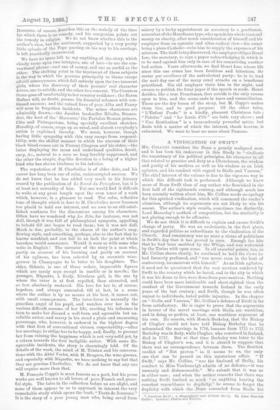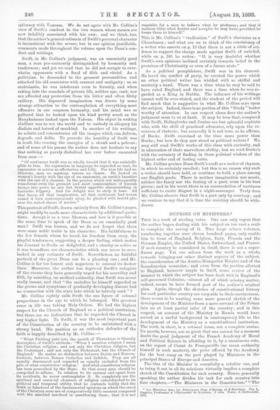A VINDICATION OF SWIFT.* cal •ancl Critical &My. By John
Chtuton Cole,at d 6h:11VAILlu?. Mn. COLLINS considers the Dean a greatly maligned man, and it has been his endeavour in this Study to "vindicate the consistency of his political principles, his character in all that related to practice and duty as a Churchman, the wisdom and purity of his motives as well as his wisdom as an Irish agitator, and his conduct with regard to Stella and Vanessa." The chief interest of the volume is due to the vigorous way in which this difficult task is performed. Although we knaw more of Dean Swift than of any author who flourished in the first half of the eighteenth century, and although much has been recently written about him, Mr. Collins needs no apology for this spirited vindication, which will command the reader's attention, although its arguments are not likely to win his assent. The author's style recalls, sometimes too distinctly, Lord Macaulay's method of composition, but the similarity is not glaring enough to be offensive.
We do not think it is difficult to explain and excuse Swift's change of party. He was an ecclesiastic, in the first place, and regarded politics as subordinate to the vindication of the Church. And consistency was no more a virtue of politicians in Swift's day that it has proved in ours. Enough for him that he had been snubbed by the Whigs, and was welcomed by the Tories with open arms. In all essential points, too, as Mr. Collins shows clearly, he continued to hold the views ho had formerly professed, and " was never, even in the heat of controversy, inconsistent with himself," As an Irish agitator, it need not be questioned that the vast services rendered by Swift to the country which he hated, and to the city in which it was his doom to live, were done from pure motives. Nothing could have been more intolerable and short-sighted than the conduct of the Government towards Ireland in the early years of the last century ; and Swift, though he was often unjust to individuals, hated public injustice. In the chapter on " Stella and 'Vanessa," Mr. Collins's defence of Swift is far from satisfactory. He is eager to prove that the arguments in favour of the secret marriage with Stella are worthless, and in doing so prefers, at least, one worthless argument of his own. He asserts, with Monck-Berkeley, that the Bishop of Clogher could not have told Bishop Berkeley that he solemnised the marriage in 1716, because from 1715 to 1721 Berkeley was in Italy, while Clogher, who remained in Ireland, died in 1717. But at that time Berkeley was tutor to the Bishop of Clogher's son, and it is absurd to suppose that there was no correspondence between them. The Scottish verdict of " Not proven " is, it seems to us, the only one that can be passed on this mysterious affair. " If Swift," says Mr. Collins, "was the husband of Stella, his conduct to Miss Vanhomrigh admits of no defence,—it was unmanly and dishonourable." We submit that it was so in either ease ; and when the author remarks that there was nothing Swift loathed so much "as anything bearing the remotest resemblance to duplicity," he seems to forget the duplicity with which the Dean concealed from Stella his
intimacy with Vanessa. We do not agree with Mr. Collins's view of Swift's conduct to the two women whose names are now indelibly associated with his own ; and we think, too, that the author's general estimate of Swift's personal character is inconsistent with the severe, but in our opinion justifiable, comments made throughout the volume upon the Dean's con- duct and writings.
Swift, in Mr. Collins's judgment, was an essentially good man, a man pre-eminently distinguished by humanity and tenderness; and yet we read that he did not scruple to over- whelm opponents with a flood of filth and vitriol. As a politician, he descended to the grossest personalities, and attacked his old associates with rancour and malignity; as an ecclesiastic, he was intolerant even to ferocity, and when raking into the scandals of private life, neither age, rank, nor sex afforded any protection from his bitter and often filthy raillery. His depraved imagination was drawn by some strange attraction 'to the contemplation of everything most offensive in our common humanity, and his mind was so polluted that he looked upon his kind pretty much as the Houyhnhnms looked upon the Yahoos. His object in writing Gulliver was to vex the world and to embody in allegory his disdain and hatred of mankind. In another of his writings, he selects and concentrates all the images which can deform, degrade, and defile. To provoke the hostility of Swift was in truth like rousing the energies of a skunk and a polecat ; and of some of his poems the author does not hesitate to say that nothing so purely diabolical has ever before emanated from man :—
" Of sentiment Swift was so wholly devoid that it was unintelli- gible to him. Its expression in language he regarded as cant, its expression in action as affectation and folly. For him life had no illusions, man no mystery, nature no charm. He looked on woman's beauty with the eye of an anatomist, on earth's beauties with the eye of a chemist. In the passion which not unfrequently transforms even the grossest and most commonplace of human beings into poets, he saw but brutal appetite masquerading in fantastic frippery. And his delight was to strip it bare. All that fancy, all that imagination, all that sentiment had woven round it torn contemptuously away, he gloated with horrid glee over the naked shame of nature."
This portrait of Swift, drawn entirely from Mr. Collins's pages, might readily be made more characteristic by additional quota- tions. Accept it as a true likeness, and how is it possible at the same time to speak of the Dean as an essentially good man P Swift was human, and we do not forget that there were some noble traits in his character. His faithfulness to the few friends whom he loved, his freedom from envy, the
playful tenderness, suggesting a deeper feeling, which makes his Journal to Stella so delightful, and a charity as active as it was boundless, are characteristics which can never be over- looked in any estimate of Swift. Nevertheless, no faithful
portrait of the great Dean can be a pleasing one ; and Mr. Collins is far too honest and sagacious to conceal its darker lines. Moreover, the author has deprived Swift's eulogists of the excuse they have generally urged for his scurrility and filth, by asserting, on medical authority, that Swift was never
really insane, and that "the maladies he himself regarded as the germs and symptoms of gradually developing disease had no connection with the state into which he latterly sank " P
Mr. Collins rightly calls Swift the one figure of colossal proportions in the age to which be belonged. His greatest error in life was taking Holy Orders. He had the highest respect for the Church of England as a political institution, but there are no indications that he regarded the Church in any higher light. To Swift, it was the most important part of the Constitution of the country to be maintained with a strong hand. His position as an orthodox defender of the faith is happily described by Mr. Collins :— " What Fielding puts into the mouth of Thwackum is literally descriptive of Swift's attitude: ' When I mention religion I mean the Christian religion ; and not only the Christian religion, but the Protestant; and not only the Protestant, but the Church of England.' He makes no distinction between Deists and Noncon- formists, between Roman Catholics and Infidels. They are all equally denounced and regarded as equally excluded from the pale of what constitutes' religion.' And what constitutes religion as been prescribed by the State. So that every man should be compelled to adhere. In relation to its essence and apart from its accidents, he never contemplates it. So completely are the spiritual and essential elements of religion subordinated to its political and temporal utility, that he contends boldly that the truth or falsehood of the fundamental opinions on which the creed of the Christian rests are of comparatively little moment compared with the mischief involved in questioning them ; that it is not
requisite for a man to believe what he professes ; and that it matters little what doubts and scruples he may have, provided he keeps them to himself."
This is Mr. Collins's " vindication" of Swift's character as a Churchman ; and what are we to think of the consistency of a writer who asserts on p. 13 that there is not a tittle of evi- dence to support the charge made against Swift of unbelief, while on p. 245 he writes : " It is very doubtful whether Swift's own opinions inclined certainly towards belief in the promises of Christianity or even of a future state."
As a political pamphleteer, Swift was in his element He loved the conflict of party, he coveted the power which no other political writer has wielded with so skilful and masterly a band. There was a time when be may be said to have ruled England, and there was a time when he was re- garded as a King in. Dublin. The influence of his writings- cannot well be over-stated, and the student of the period will find much that is suggestive in what Mr. Collins says upon the subject. Indeed, there is no portion of this " Study " better worthy of attention. In one respect alone does the author's judgment seem to us at fault. It may be true that, compared with Swift, Bolingbroke and Junius are but splendid sophists who, with the skill of practised advocates, rely upon the re- sources of rhetoric; but assuredly it is not true, as he affirms, of Burke. Swift exercised at the time more power than Burke ; but how do they now stand as political writers P We may still read Swift's works of this class with curiosity, and, in admiration of their marvellous ability ; but we read Burke's with the certainty of finding in them political wisdom of the highest order and of lasting value.
Mr. Collins praises Dean Swift's craft as a maker of rhymes, in which he certainly excelled; but this is no reason why such a writer should have held, or continue to hold, a place among our English poets. There is neither imagination nor music, neither the fancy nor the feeling of a poet, even in his best pieces ; and in his worst there is an accumulation of nastiness sufficient to excite disgust in a night-scavenger. Truly does Mr. Collins observe that Swift is a poet only by courtesy ; and we venture to say that it is time the courtesy should be with,. drawn.



































 Previous page
Previous page